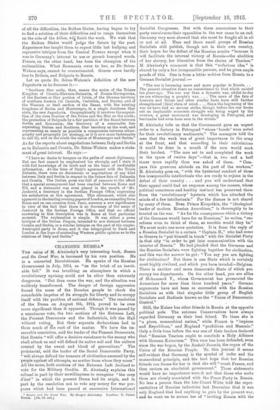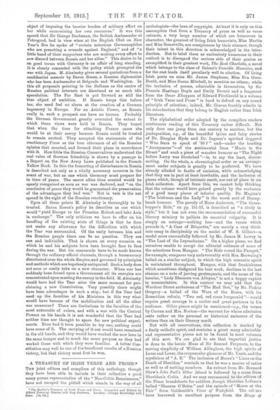CHANGING RUSSIA.*
TSB value of M. Alesinsky's very interesting book, Russia and the Great War, is increased by his own position. He is a converted. Revolutionist. He speaks of the Russian Government in July, 1914, as "on the brink of an inevit- able fall." It was breathing an atmosphere in which a revolutionary uprising could not be other than extremely dangerous. "But then came the war, and the situation was suddenly transformed. The danger of foreign aggression forced the mass of the Russian people to check the remarkable impetus of its struggle for liberty and to occupy itself with the problem of national deferace." The resolution of the Duma on August 8th, 1914, proved to be even more significant than it appeared. Though it was passed by a unanimous vote, the two sections of the Extreme Left, the Peasant Democrats and the Industrials, left the Hall without voting. But their separate declarations lied in them much of tte root of the matter. We have the im- movable conviction, said the leader of the Peasant Democrats, that Russia "will offer a decisive resistance to the enemy who shall attack us and will defend its native soil and the culture created by the sweat and blocid of generations." The proletariat, said the leader of the Social Democratic Party, "wilt always defend the treasure of civilization amassed by the people against all attempts, no matter from whom they come." All the same, both sections of the Extreme Left declined to vote for the Military Credits. M. Alexinsky explains this refusal in part by their unwillingness to recognize " the coup d'Otat" in which the present Dunn, had its origin, and in part by the resolution not to vote any money for war pur- poses which had been passed at successive International Rugaia and the Great War. Ily Oregon Alexinsky. London: T. Fisher Unwin. [10e. ed. not,]
Socialist Congresses. But with these concessions to their party consciences their opposition to the war came to an end. Germany very soon showed that she must be fought all in all or not at all. Here and there small groups of Russian Socialists still publish, though not in their own country,
their hopes for the defeat of the Russian armies "because it will facilitate the internal victory of Russia—the abolition of her slavery, her liberation from the chains of Tsarism." M. Alexinsky's comment is that this "nefarious idea" is shared by only a few irresponsible persons, and he gives ample proofs of this. One is from a letter written from Russia to e German Socialist journal :— " The war is becoming more and more popular in Russia.. The present situation bears no resemblance to that which existed ten years ago. The war was then a dynastic war, whilst to-day we tire witnessing a people's war. . . . The news of the fate of Louvain and Reims and other similar facts have still further strengthened [this] state of mind.. .. Since the beginning of the war we have had no serious strike, though before the war broke out an implacable economic struggle was being waged by the workers, a great movement was developing in Petrograd, and barricades had even been seen in the streets. '
M. Alexinsky tells us that the Government gave an urgent order to a factory in Petrograd "whose ' hands' were noted for their revolutionary sentiments." The managers told the men that the work was of great importance to the army
at the front, and that according to their calculations it could be done in a month if the men would work their hardest. " The men set to and completed the work in the space of twelve days "—that is, two and a half times more rapidly than was asked of them. " Com-
pare this generous attitude on the part of the workers," M. Alexinsky goes on, " with the hysterical conduct of those few irresponsible intellectuals who are ready to rejoice in the defeat of their country . . . and you will understand that their appeal could find no response among the masses, whose political conscience and healthy instinct has preserved them from the ' revolutionary ' hysteria which has attacked the minds of a few intellectuals." For the disease is not shared by many of them. Even Prince Kropotkin, the "ideological leader of modern Russian Anarchism," is thoroughly to be trusted on the war. As for the consequences which a victory of the Germans would have for us Russians," he writes, "one refuses even to think of them, so terrible would they be." We must make one more quotation. It is from the reply of
a Russian Socialist to a certain " Captain B.," who had come to Geneva to "put himself in touch " with the Socialist Party in that city "in order to get into communication with the interior of Russia." He had pleaded that the Germans and the Russian Socialists were fighting together for civilization,
and this was the answer he got: "You say you are fighting for civil ization P But there is one State which is certainly most highly civilized, and which you have invaded—Belgium. There is another and more democratic State of which you occupy ten departments. On the other hand, you are allies of Mohammed V., whose Government has persecuted the Armenians for more than three hundred years." German arguments have not been so successful with the Russian Socialists as with that singular little group of English Socialists and Radicals known as the " Union of Democratic Control."
Still, the Kaiser has other friends in Russia at the opposite political pole. The extreme Conservatives have always regarded Germany as their best friend. To them she is "a pious, monarchical nation," while France is "impious and Republican," and England "perfidious and Masonic." Only a little time before the war one of their leaders declared that "Russian Tsarism ought to conclude a Holy Alliance with German. Kaiserism." This view has been defended, even since the war began, by the Roskoid Znamia, the organ of the Union of the Russian People. To this journal it seems self-evident that Germany is the symbol of order and the monarchical. principle, and the best hope that her Russian friends can frame for her is that she will "crush France, and then restore an absolutist government." These statements would have no importance were it not that those who make them are closely associated with the Peace Party in Russia. No less a person than the late Count Witte told the repre- sentatives of Russian industries last December that it was only England that had anything to gain by the present war, and he went on to accuse her of " inciting Russia with the object of imposing the heavier burden of military effort on her while economizing her own resources." It was this speech that Sir George Buchanan, the British Ambassador at Petrograd, had in view when at the English Club on New Year's Eve he spoke of " certain notorious Germanophiles who are preaching a crusade against England," and of "a little band of their supporters who are making every effort to bow discord between Russia and her allies." This desire to be on good terms with Germany is an affair of long standing. It is closely connected with the policy which prompted the war with Japan. M. Alexinsky gives several quotations from a oonfidential memoir by Baron Rosen, a Russian diplomatist who has been Ambassador at Belgrade and Washington. In this all proposals pointing to the Balkans as the centre of Russian political interests are dismissed as so much idle 'peculation. The Far East is put forward as still the true object of ambition. If Russia keeps this before her, she need feel no alarm at the creation of a German hegemony in Europe. For an Asiatic Power, as Russia really is, such a prospect can have no terrors. Probably the German Government greatly overrated the extent to which these views were held in Russia. They hoped that when the time for attacking France came she would be at their mercy because Russia could be trusted to remain neutral. They accepted the statements of the reactionary Press as the true utterance of all the Russian opinion that counted, and formed their plans in accordance with it. How little the Russian Conservatives understood the real value of German friendship is shown by a passage in a Report on the New Army Laws published in the French Yellow Book. In this the fomenting of disturbances in Russia is described not only as a vitally necessary measure in the event of war, but as one which Germany must prepare for in time of peace. The secret allies thus created would be openly recognized as soon as war was declared, and " on the conclusion of peace they would be guaranteed the preservation of the advantages they had won." Not in vain is the net spread in the sight of the Russian reactionary.
Upon all these points M. Alexinsky is thoroughly to be trusted. Baron Rosen's policy be describes as one which would " yield Europe to the Prussian Moloch and take Asia in exchange." The only criticism we have to offer on his handling of the existing state of things is that he does not make any allowance for the difficulties with which the Tsar was surrounded. Of the unity between him and the Russian people there can be no question. They are one and indivisible. That is shown on every occasion on which he and his subjects have been brought face to face during the war. But his commands have to be made known through the ordinary official channels, through a bureaucracy distributed over the whole Empire, and governed by principles and methods which are hopelessly antiquated. Such a body does not soon or easily take on a new character. When war has suddenly been forced upon a Government all its energies are concentrated upon meeting the enemy in the field. M. Alexinsky would have had the Tsar seize the same moment for pro- claiming a new Constitution. Very possibly there might have been advantages in such a step ; but if the Tsar had need up the faculties of his Ministers in this way what would have become of the mobilization and all the other war measures P There are limitations to the faculties of the most autocratic of rulers, and with a war with the Central Powers on his hands it is not wonderful that the Tsar had neither time nor thought to spare for new political experi- ments. Even had it been possible to try one, nothing could have come of it, The carrying of it out would have remained in the old hands, and they would have worked the new laws in the same temper and to much the same purpose as they had worked those with which they were familiar. A better Con- stitution may well be one of the beneficent results of a Russian victory, but that victory must first be won.



































 Previous page
Previous page